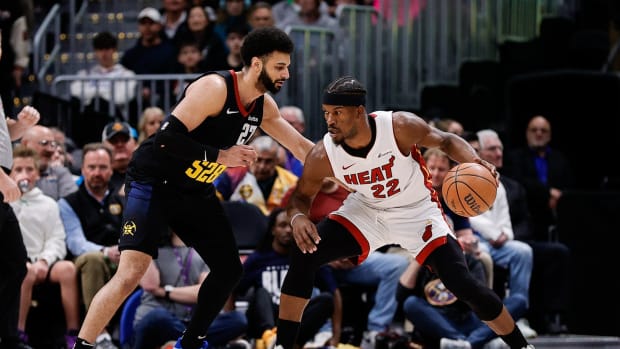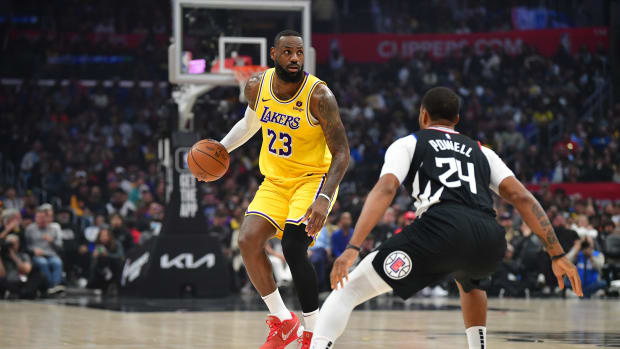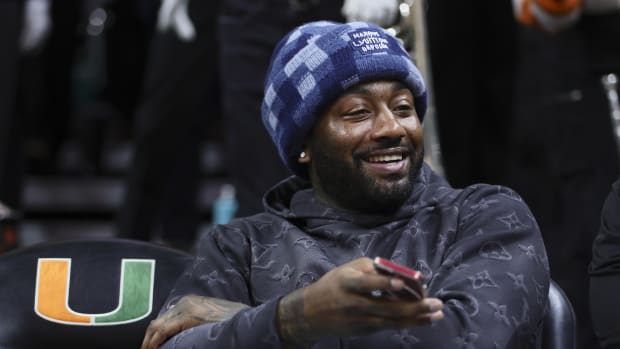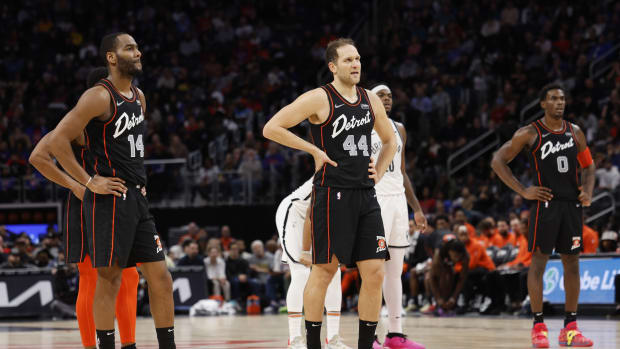Analyzing the Case: Attorney Sues Heat, Claims Team Fired Her For Taking Parental Leave
In a new federal lawsuit, a prominent sports attorney who recently became a mother accuses the Miami Heat of violating the Family and Medical Leave Act.
Vered Yakovee, who served as vice president and associate general counsel of the Heat from March 2015 to December 2019, contends that team leadership began to treat her poorly—and illegally—after she informed them that she was adopting a newly born baby and would need to go on maternity leave.
Yakovee is an accomplished sports attorney (in full disclosure, I know her as a fellow sports attorney). Prior to joining the Heat, Yakovee served as associate team counsel for the Boston Celtics. She also ran her own Los Angeles-based law firm through which she represented high-profile sports clients, including an NBA franchise.
Yakovee’s complaint is authored by her attorney, Erika Deutsch Rotbart. It was recently filed in U.S. District Court for the Southern District of Florida and is presided over by Judge Federico Moreno. The complaint, which demands a jury trial, contends that Yakovee excelled at her job and that she only became a problem for the Heat after she took time to care for her baby.
To that end, the complaint carefully highlights evidence of the quality of Yakovee’s work. Yakovee, the complaint maintains, received annual pay increases, along with merit-based bonuses twice every year. Her last performance evaluation before taking leave occurred in January 2019. Yakovee’s supervisor, Heat general counsel Raquel Libman, indicated that Yakovee had “exceed expectations” in every category of review.
Yakovee was approved to become an adoptive parent in June 2018. Thirteen months later, on the evening of July 9, 2019 Yakovee learned that she was selected to adopt a newly born baby. The following morning, Yakovee informed the Heat of the pending adoption. Yakovee also stressed that she would need immediate parental leave in order to care for her infant.
According to the complaint, Libman (Yakovee’s immediate supervisor) reacted unfavorably to the request for leave. The complaint asserts that Libman expressed, “now I definitely won’t get to take a vacation.” Yakovee insists that she offered to assist Libman in a temporary transition of matters and advise those who would take on her work while she was away. The complaint charges that Libman rebuffed such offers.
Yakovee invokes her FMLA rights and goes on leave
After notifying the Heat, Yakovee went on 12-week FMLA parental leave. FMLA is a federal law that applies to businesses with 50 or more employees (among other types of employers). It requires them to provide eligible employees with up to 12 weeks of unpaid leave in the event of a qualified circumstance. Care of a newborn child is a qualified circumstance.
An employer can’t retaliate against an employee who requests FMLA leave, nor can it punish him or her for taking leave. Importantly, an employer can’t demote, discriminate against or fire an employee merely for taking leave. In fact, the FMLA compels the employer to make the employee’s job, or a similar job, available to him or her upon their return to work. However, an employer can fire an employee on leave when it reflects unrelated reasons (such as for bad performance reviews or as part of a company layoff).
About a month into her leave, Yakovee says that she received an email from Eric Woolworth, the Heat’s president of business operations. The email, as depicted in the complaint, included Woolworth worrisomely relaying that Libman was “upset” about Yakovee’s parental leave benefit.
Yakovee returns to work and contends that she is mistreated
Yakovee returned to work last October. As asserted in the complaint, Yakovee could immediately tell that her presence was unwelcome.
The complaint maintains that Libman sent Yakovee an email accusing her of missing deadlines during her leave and misrepresenting a project that Yakovee had worked on prior to taking leave. The email (again, as retold by the complaint) also assigned a new project to Yakovee. Yakovee contends that she responded to Libman’s email with updates and questions, but that Libman never got back to her.
The complaint goes on to detail an increasingly distressing work environment for Yakovee, whom is depicted as a target of scorn for exercising her legal rights. Libman, in particular, is portrayed as making Yakovee’s work life challenging. The complaint asserts that Libman treated Yakovee “with disdain and hostility” and “berated” her.
Further, according to the complaint, Libman in group meetings and in group emails complained about Yakovee. The complaint describes one email where Libman lambasted Yakovee for failing to provide “any kind of project or status list of [her] work when [she] went out on leave”—even though, according to the complaint, Yakovee had repeatedly offered to help in the transition. In another alleged group email, Libman is portrayed as accusing Yakovee of using a license agreement form that contained an error (there was no error, the complaint charges) and blaming Yakovee for utilizing templates that Libman had encouraged her to use.
Meanwhile, according to Yakovee, Libman refused to respond to her questions. Libman also allegedly cancelled her weekly one-on-one meeting with Yakovee and began to bypass Yakovee in directing assignments. The complaint details Libman assigning projects to the team’s assistant general counsel, a lower-ranked attorney who reported to Yakovee, that had previously been directed to Yakovee.
Yakovee’s situation with the Heat further deteriorated in November when (as portrayed by the complaint) Libman called Yakovee into her office to give a performance review. Yakovee found the timing of the review both suspicious and irregular since, according to the complaint, Heat reviews are normally conducted in January. For the first time since Yakovee had been reviewed by her, Libman was highly critical of Yakovee’s work product. Yakovee contends the review contained “erroneous” and “unfounded” lines of criticism, which Libman allegedly refused to explain. Libman instead gloomily told Yakovee to speak with human resources since there was an “investigation” into Yakovee.
Yakovee was stunned to learn of an “investigation” and went to speak with Woolworth (president of business ops) about it. Yakovee asked him to appoint an independent and neutral investigator to oversee questions about her work and performance. Yakovee stressed that she had serious reservations about the objectivity of an investigation that relied on a supervisor whom Yakovee believed was unfair. The request was denied.
Hours later, the director of human resources emailed Yakovee to claim that Yakovee had failed to provide sufficient advance notice for taking FMLA leave. Yakovee’s complaint characterizes the HR email as dubiously timed. Perhaps, the complaint surmises, the email was designed to litter Yakovee’s employee file with evidence that could be used to justify a firing.
A day after taking her baby to the hospital, Yakovee is fired
Yakovee’s employment with the Heat would end a day after she used a sick day to bring her ill baby to the hospital. On Dec. 19, Woolworth called her into his office. He told her that she was terminated and would need to leave the office immediately. She complied with the directive.
Within a couple of hours of being fired, Yakovee received a text message from a law firm retained by the Heat. The firm encouraged Yakovee to sign a general release and severance agreement. As depicted in Yakovee’s complaint, the agreement would have required her to “waive all of her rights in exchange for monetary compensation.” It was an attempt, the complaint charges, to “buy her silence.”
Yakovee refused to sign it. She hired an employment lawyer instead.
The legal claims
Yakovee’s complaint contains two claims, one for FMLA interference and the other for FMLA retaliation.
FMLA Interference refers to an employer illegally preventing an employee from exercising his or her FMLA rights. FMLA retaliation, in contrast, refers to a range of punishments an employer might illegally impose in response to an employee lawfully exercising his or her FMLA rights. Demotions, reassignments, discriminations, firings and related adverse consequences can qualify as forms of illegal retaliation. Yakovee insists the Heat interfered with her use of FMLA and, as a form of retaliation, fired her.
Yakovee also maintains there are “no legitimate or non-discriminatory reasons” for the Heat’s decision-making. She further asserts that she complied with all applicable notice requirements.
Yakovee demands the following from the Heat:
• A judgment that the Heat illegally retaliated against her for attempting to exercise her right to a leave of absence.
• Compensation for lost wages, benefits, and other remuneration.
• Reinstatement to a position comparable to her prior position with back pay plus interest, pension rights and all benefits, or in the alternative, fair compensation.
• Lost pay and other damages.
• All costs and attorney’s fees incurred in pursuing the claims.
The Heat’s potential defenses
The allegations described above are contained in a complaint, which is a pleading that commences a litigation. The allegations are neither told by a neutral narrator nor proven (yet). They are raised by an attorney—an advocate—whom Yakovee retained. The Heat will answer the complaint and will likely dispute the accuracy and context of the assertions. This seems particularly likely for statements attributed to Libman, whom the complaint portrays in a very negative light. It will be up to the court to determine which retelling of history is more believable.
In addition to attempting to rebut Yakovee’s narration, the Heat will likely offer assertions of fact that advantage the team’s position. For instance, the Heat might claim that Yakovee performed poorly in aspects of her job. Anticipating this line of critique, Yakovee’s complaint stresses that she consistently received exemplary performance reviews. Only after she left to care for her baby did her employer sharply criticize her work. However, the more evidence and detail the Heat can provide to debunk this narrative, the stronger its defense. The team must also show that any criticisms of Yakovee were based on objective evaluations—not on unprofessional retaliations or personal recriminations.
The Heat could also claim that relevant procedure is on its side. The team seems likely to assert that Yakovee failed to comply with FMLA’s procedural requirements, including with respect to providing sufficient notice for taking leave. The team already raised this point with Yakovee while she was employed. Yakovee’s complaint notes that she provided notice on July 11, 2019, the day after learning about the adoption. The complaint’s timeline also indicates that she began her leave the next day, July 12, 2019. The FMLA requires that an employee should provide at least 30 days of notice for a foreseeable circumstance, such as a planned surgery. If the circumstance isn’t foreseeable, then notice must be provided “as soon as practicable.” Yakovee maintains that she adhered to this requirement; the team seems inclined to disagree.
Last, but not least, the Heat will probably argue that Yakovee’s lawsuit should be dismissed on grounds of compulsory arbitration. As a condition of her employment with the Heat, Yakovee signed a document called “Agreement to Arbitrate.” Sports Illustrated has obtained this document, as it was filed as an exhibit to the complaint. Compulsory arbitration is a standard requirement in many employment arrangements.
When arbitration is enforced, it preempts an employee from going to court to sue his or her employer. The employee must instead pursue arbitration, which is conducted in private. Arbitrations are generally less threatening to employers, particularly employers with prominent profiles. This is because evidence and testimony derived through an arbitration remain confidential and are much less likely to publicly surface. A court proceeding, in contrast, is a public record by default. Various information produced during a litigation can find itself in the hands of journalists and broadcasters.
The Yakovee-Heat agreement expresses that both sides agree to arbitrate “any controversy arising out of or relating to the employment relationship or the termination of that relationship, as well as any other claim arising in the workplace environment.” The agreement further defines “controversy” to mean “all claims, disputes, actions or issues ... which are related to or arise out of the employment relationship or the employment environment” and which include claims under the FMLA and other statutes.
Yakovee’s complaint anticipates the Heat arguing that her FMLA lawsuit must be dismissed on account of the arbitration agreement. The complaint asserts that the agreement is not enforceable because it defies the FMLA. The agreement allegedly does so because it forbids the arbitrator from awarding costs incurred in litigating (such as costs to the attorney by filing records in court, hiring experts, photocopying, postage etc.). The FMLA, the complaint stresses, demands that a successful plaintiff is entitled to both attorney’s fees (which reflect the labor of the attorneys) and costs. To support this position, Yakovee’s complaint cites a recent decision by the U.S. Court of Appeals for the 11th Circuit. The 11th Circuit has jurisdiction over federal courts in Florida and is thus decisions by the 11th Circuit constitute precedent for Florida federal cases. In Trevisan Hudson, et al. v. P.I.P, the 11th Circuit found an arbitration agreement unenforceable on grounds that it required each party to bear their own fees and costs. In response, expect the Heat to propose precedent that favors its position on arbitration.
Next steps
Although Yakovee demands a jury trial, the most likely resolution to her case is an out-of-court settlement.
First consider the perspective of the Heat. Team officials may be concerned that they’ll be portrayed as insensitive, if not much worse, the further the case advances. Estimated by Forbes as worth $1.95 billion, the Heat and its owner, billionaire Micky Arison, clearly have the wherewithal to negotiate a settlement.
Then there is the NBA. While the league is not a party to the litigation and played no role in the situation, NBA officials obviously do not wish to see one of their franchises accused of mistreating a new parent. It would not be surprising if those officials urged the Heat to seriously explore settlement opportunities with Yakovee.
Yakovee, for her part, might eventually gravitate towards a settlement as well. She clearly believes that she was wronged and she demands justice. At the same, as an attorney, Yakovee is aware that the Heat will likely raise unflattering commentary about her in court pleadings. Also, given her accomplishments as an attorney, Yakovee will likely receive appealing legal job opportunities in sports and in other industries. Assuming she pursues such an opportunity, closure with the Heat might prove attractive.
Given the animosity of the situation, one thing is for sure: any settlement would almost certainly include a non-disparagement clause that forbids either side from criticizing the other.
Sports Illustrated will keep you updated on the case.
Michael McCann is SI’s Legal Analyst. He is also an attorney and the Director of the Sports and Entertainment Law Institute at the University of New Hampshire Franklin Pierce School of Law.


































